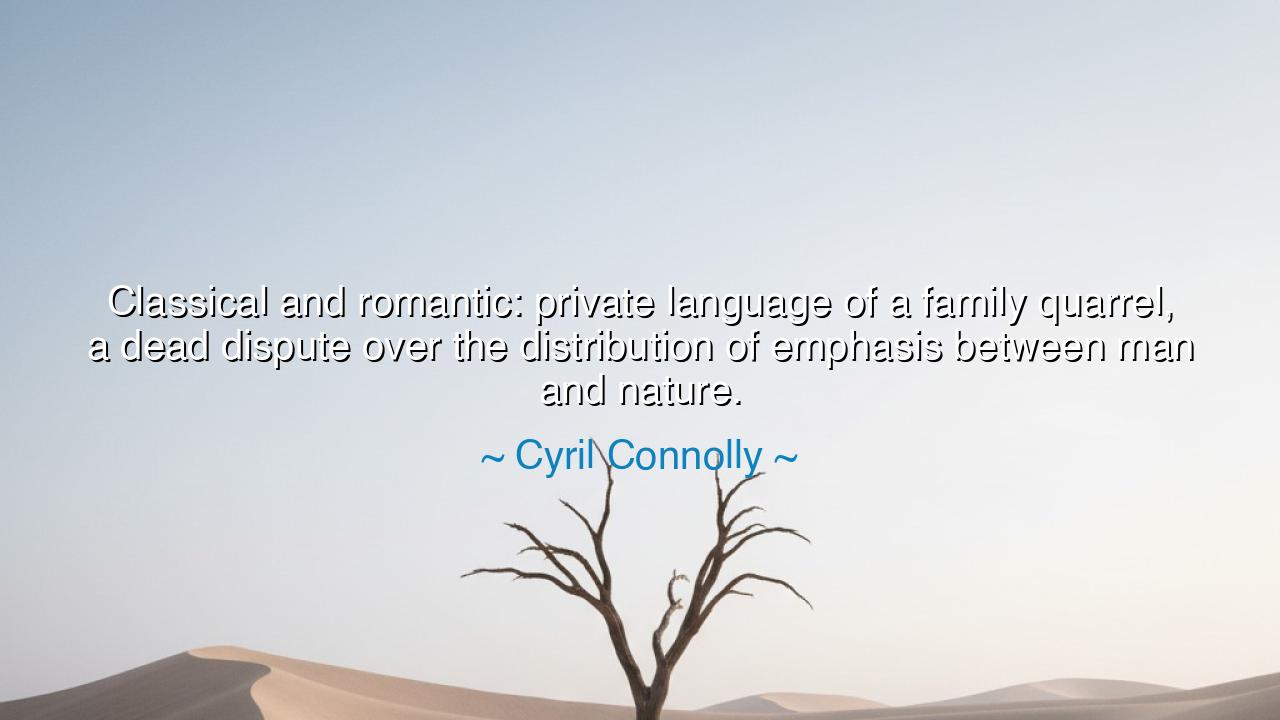
Classical and romantic: private language of a family quarrel, a
Classical and romantic: private language of a family quarrel, a dead dispute over the distribution of emphasis between man and nature.






Hear the words of Cyril Connolly, sharp in wit and steeped in history: “Classical and romantic: private language of a family quarrel, a dead dispute over the distribution of emphasis between man and nature.” In these words, he reduces centuries of artistic and philosophical debate to a quarrel among kin, a feud whose fire has burned out. Once, the battle between classical restraint and romantic passion shook the worlds of art, literature, and thought. Yet Connolly calls it a “dead dispute,” reminding us that such divisions, though once fierce, are often more illusion than truth.
The classical, in its essence, was the devotion to order, harmony, and measure. It was the path of the Greeks, who sought balance between mind and body, between reason and form. To them, beauty was symmetry, the triumph of man’s intellect shaping chaos into order. By contrast, the romantic was the cry of the soul, the storm of passion, the reverence for wild nature over human restraint. It was the thunder of Beethoven against the careful poise of Mozart, the storm-lit canvases of Turner against the still marbles of Phidias. For centuries, these two stood as adversaries, warring for the spirit of humanity.
Connolly, however, saw their quarrel as kinship disguised as opposition. For both classical and romantic sought the same goal: to express the human condition, to place man and nature into a frame of meaning. Their dispute was not truly about essence, but about emphasis—whether to exalt man’s reason or nature’s majesty. He calls it the “private language of a family quarrel,” for like brothers arguing at the table, their fight was fierce but their blood was shared.
Consider the example of Wordsworth and Pope. Pope, the poet of the classical spirit, crafted verse like a jeweler, polished, precise, and orderly. Wordsworth, the poet of the romantic spirit, wandered hills and lakes, pouring into his lines the wild pulse of nature. They seem opposed, yet both strove to elevate the human spirit, one through discipline, the other through freedom. Their quarrel was real, but it was kinship quarreling over which path leads more directly to truth.
Connolly’s words remind us that such disputes, while heated in their time, eventually fade. The question of whether the classical or the romantic is superior is no longer urgent, for we live with both. In our age, we read Homer and Shelley, admire Greek temples and Gothic cathedrals, listen to Bach and Chopin. The quarrel, once deadly, has become heritage. And so Connolly names it a “dead dispute,” for the fire has cooled into memory, and we see now not rivals, but complementary visions.
The lesson is profound: do not let yourself be trapped in false oppositions. Many quarrels of today—whether in art, in politics, or in life—may one day be seen as kinship misunderstood. What seems irreconcilable may, in truth, be two parts of the same whole. Man and nature, reason and passion, discipline and freedom—these are not enemies, but partners who must be brought into balance.
Therefore, children of tomorrow, learn from Connolly’s insight. Do not waste your spirit in quarrels that divide what should be united. Instead, seek the harmony of opposites. When others argue that only order matters, remember the power of passion. When they declare that only passion matters, remember the strength of order. The quarrel between classical and romantic is over, but its wisdom remains: greatness is found not in choosing one, but in weaving both into the fabric of your life.
Thus, Connolly’s words, sharp and dismissive, are also liberating. He shows us that the family quarrel has ended, and we are free to inherit the riches of both traditions. And so let us live as heirs to both: with the balance of the classical, and the fire of the romantic, holding man and nature in equal reverence, as two halves of one eternal truth.






AAdministratorAdministrator
Welcome, honored guests. Please leave a comment, we will respond soon